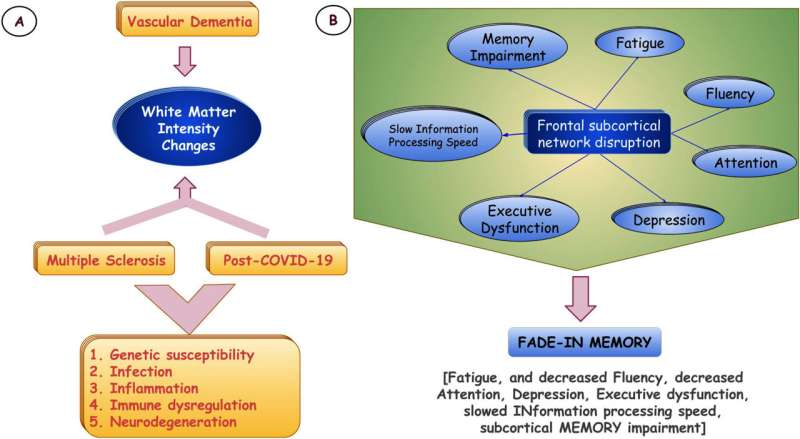This article has been reviewed according to Science X's editorial process and policies. Editors have highlighted the following attributes while ensuring the content's credibility:
fact-checked
trusted source
proofread
New study shows SARS-CoV-2 infection accelerates the progression of dementia

Infection with SARS-CoV-2 has a significant impact on cognitive function in patients with preexisting dementia, according to new research published in the Journal of Alzheimer's Disease Reports. Patients with all subtypes of dementia included in the study experienced rapidly progressive dementia following infection with SARS-CoV-2.
Since the first wave of COVID-19, neurologists have noticed both acute and long-term neurological syndromes and neuropsychiatric sequelae of this infectious disease. Insights into the impact of COVID-19 on human cognition has so far remained unclear, with neurologists referring to "brain fog."
A group of researchers driven to gain a better understanding of and dissipate this fog investigated the effects of COVID-19 on cognitive impairment in 14 patients with preexisting dementia (four with Alzheimer's disease [AD], five with vascular dementia, three with Parkinson's disease dementia, and two with the behavioral variant of frontotemporal dementia), who had suffered further cognitive deterioration following COVID-19.
Lead investigators Souvik Dubey, MD, DM, from the Department of Neuromedicine, Bangur Institute of Neurosciences (BIN), Kolkata, West Bengal, India, and Julián Benito-León, MD, Ph.D., from the Department of Neurology, University Hospital "12 de Octubre," Madrid, Spain, explained, "We speculated there must have been some deleterious effect of COVID-19 in patients with preexisting dementia extrapolating our understanding from the cognitive impact of this viral infection in patients without dementia. However, post-COVID-19 evaluation of cognitive impairments in patients with preexisting dementia is difficult due to multiple confounders and biases."
In addition to finding that that all subtypes of dementia, irrespective of patients' previous dementia types, behaved like rapidly progressive dementia following COVID-19, the team of investigators found that the line of demarcation between different types of dementia became remarkably blurry post-COVID-19.
Co-investigator Ritwik Ghosh, MD, Department of General Medicine, Burdwan Medical College and Hospital, Burdwan, West Bengal, India, expressed his concern about dementia subtyping. "It is more difficult in the post-COVID-19 era, where the history of this viral infection plays the most important role. Few patients with a history of COVID-19 without preexisting dementia have phenotypically and imaging-wise similar brain changes mimicking other degenerative and vascular dementias."
Researchers also found that the characteristics of a particular type of dementia changed following COVID-19, and both degenerative and vascular dementias started behaving like mixed dementia both clinically and radiologically. A rapidly and aggressively deteriorating course was observed in patients having insidious onset, slowly progressive dementia, and who were previously cognitively stable.
Cortical atrophy was also evident in the study's subsequent follow-ups. Coagulopathy involving small vessels and inflammation, which were further correlated with white matter intensity changes in the brain, was considered the most important pathogenetic indicator.
The rapid progression of dementia, the addition of further impairments/deterioration of cognitive abilities, and the increase or new appearance of white matter lesions suggest that previously compromised brains have little defense to withstand a new insult (i.e., a "second hit" like infection/dysregulated immune response and inflammation).
According to Dr. Dubey and his co-investigators, "'Brain fog' is an ambiguous terminology without specific attribution to the spectrum of post-COVID-19 cognitive sequelae. Based on the progression of cognitive deficits and the association with white matter intensity changes, we propose a new term: 'FADE-IN MEMORY' (i.e., Fatigue, decreased Fluency, Attention deficit, Depression, Executive dysfunction, slowed INformation processing speed, and subcortical MEMORY impairment)."
Co-investigator Mahua Jana Dubey, MD, Department of Psychiatry, Berhampur Mental Hospital, Berhampur, West Bengal, India, added, "Amidst various psychosocial impacts of COVID-19, cognitive deficits, when accompanied by depression and/or apathy and fatigue in patients with or without preexisting dementia, require meticulous evaluation because it imposes added stress and burden on caregivers, one of the most important but often forgotten issues that may have the potential to hamper treatment."
"As the aging population and dementia are increasing globally, we believe pattern recognition of COVID-19-associated cognitive deficits is urgently needed to distinguish between COVID-19-associated cognitive impairments per se and other types of dementia. This understanding will have a definitive impact on future dementia research," Dr. Souvik Dubey concluded.
"Increasing epidemiological evidence of the association of COVID-19 and AD is the heightened risk of AD with COVID-19, and of increased COVID-19 in patients with AD points to shared pathogenesis. Dubey et al further clarify this connection in demonstrating COVID-19 fundamentally alters the course of dementia no matter the cause," remarked George Perry, Ph.D., Editor-in-Chief, Journal of Alzheimer's Disease, and Semmes Distinguished University Chair in Neurobiology at The University of Texas at San Antonio.
More information: Souvik Dubey et al, The Effects of SARS-CoV-2 Infection on the Cognitive Functioning of Patients with Pre-Existing Dementia, Journal of Alzheimer's Disease Reports (2023). DOI: 10.3233/ADR-220090


















